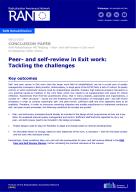Details
- Publication date
- 15 March 2021
- Author
- Directorate-General for Migration and Home Affairs
- RAN Publications Topic
- Rehabilitation
Description
Self- and peer review in Exit work (and the larger work field of rehabilitation) can be a crucial part of quality management processes in daily practice. Unfortunately, in large parts of the P/CVE field, a lack of ‘culture’ of quality control, in which systematic reviews could be implemented, persists. Instead, high external pressure has lead to a very practical hands-on tradition in the work field, which now needs to be supplemented with space for critical reflection.
Experiences from first-line practitioners show, that in many projects, approaches and organisations, a number of – often structural – issues are still hindering the implementation of meaningful peer- and self-review processes in order to conduct meaningful self- and peer-review, sufficient staff and time capacities need to be available.
Therefore, in order to overcome remaining obstacles and enable practitioners to implement continuous self- and peer review processes, the following conditions for success are pivotal:
- Peer- and self-review processes should already be included in the design of Exit programmes as they are a key factor for sustained internal quality management and control. Sufficient staff and time capacities to carry out peer- and self-reviews need to be included in the design processes.
- Project designs need to allow for flexibility to adapt and change based on relevant developments.
- An articulated theory of change, based on clear objectives of the work, is necessary – both for the larger project and the work with individual clients.
Interestingly, these conditions align very well with the prerequisites for peer- and self-reviews defined in the RAN Peer and Self Review Manual, further indicating the practical relevance of the manual.
The following pages will provide a short overview of the discussions on the implementation of peer- and self-review processes. Based on this, some recommendations in support of further implementation of such processes in Exit projects and programmes across the EU will be provided.

